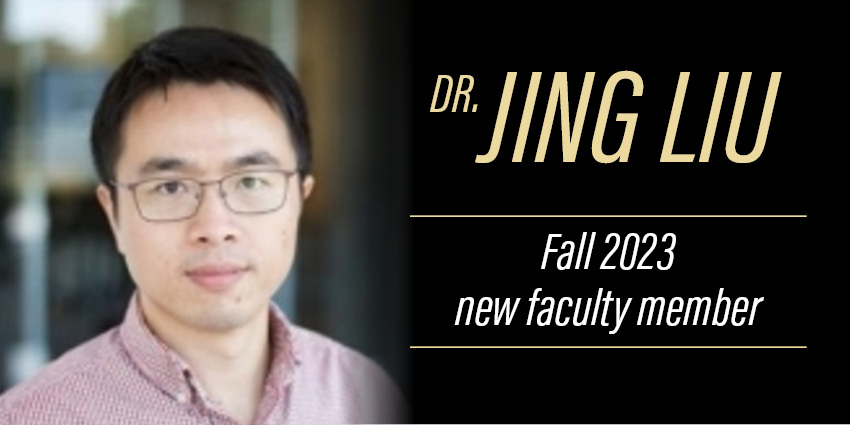Dr. Jing Liu joins the faculty of the Department of Physics and Astronomy at Purdue University
2023-07-21

The Department of Physics and Astronomy at Purdue University welcomes a new member to the faculty in the fall of 2023, Dr. Jing Liu. His research focuses on the development of cutting-edge imaging methods and biophysical analysis tools to quantitatively interpret the complexity of molecules in a human cell. He was an assistant professor of Physics at the Indiana University - Purdue University Indianapolis (IUPUI).
"The utilization of physical sciences in cell biology is highly underestimated," says Liu. "Classical biology research is mostly based on the experimental observations; in the past decade, the newly emerged technologies and computational power have made the biological experiments quantitatively interpretable. I am especially interested in the spatiotemporal dynamics of the DNA and RNA that are the building blocks of life. Understanding these fundamental physical properties in the human cell will facilitate the diagnosis, treatment, and prevention of cancers, diabetes, and Alzheimer's Disease. My further research will integrate quantum optics techniques that would enable further advances in these fields."
Liu, an Associate Professor, will be teaching general physics, advanced laboratory, biophysics, and optics/advanced optics. While being at IUPUI, he has established his teaching philosophy by using the "Just In Time" method of teaching.
"I have integrated student active learning, group activities, and hands-on experience into my courses," explains Liu. "I intentionally create a collaborative learning environment, in which I act as a facilitator of learning and a resource to help in the students' own learning. Students are encouraged and expected to be actively involved in the learning process. In my classes, I have attempted to provide students with both theoretical perspectives and immediate practical applications necessary for their mastery of the course material. In addition, I also help students develop their presentation and writing skills through projects and presentations."
When not teaching or conducting research, Liu enjoys running. "I usually run 10k several times per week," he says. "This is the time that belongs to myself and I can focus on thinking about/brainstorming one specific thing over a long time."
Liu is no stranger to the West Lafayette campus; he received his Ph.D. at Purdue in 2015 in biological engineering from the Departments of Agriculture and Biological Engineering. Prior to this, he received his B.S. in physics at Nanjing University and his M.S. in optics at the Chinese Academy of Sciences (both located in China). After receiving his degree at Purdue, he immediately started an independent lab at the South Dakota School of Mines and Technology, then relocated to IUPUI in 2017. He is also affiliated with the Indiana University School of Medicine as a member of the Simon Comprehensive Cancer Center, Indiana Center of Diabetes and Metabolic Diseases, and Center for Computational Biology and Bioinformatics.
"The reason I chose to come to Purdue is the fantastic group of peers and excellent students in the physics department, College of Science, and across the entire west Lafayette campus," he says. "I appreciate the aggression on the research advances and emphasis on the engineering and physical science in biomedicine. At Purdue, I wish to establish a multidisciplinary biophysics program by connecting the strong physics and engineering research in West Lafayette with the unmet need in biomedicine in Indianapolis."
About the Department of Physics and Astronomy at Purdue University
Purdue Department of Physics and Astronomy has a rich and long history dating back to 1904. Our faculty and students are exploring nature at all length scales, from the subatomic to the macroscopic and everything in between. With an excellent and diverse community of faculty, postdocs, and students who are pushing new scientific frontiers, we offer a dynamic learning environment, an inclusive research community, and an engaging network of scholars.
Physics and Astronomy is one of the seven departments within the Purdue University College of Science. World-class research is performed in astrophysics, atomic and molecular optics, accelerator mass spectrometry, biophysics, condensed matter physics, quantum information science, particle and nuclear physics. Our state-of-the-art facilities are in the Physics Building, but our researchers also engage in interdisciplinary work at Discovery Park District at Purdue, particularly the Birck Nanotechnology Center and the Bindley Bioscience Center. We also participate in global research including at the Large Hadron Collider at CERN, many national laboratories (such as Argonne National Laboratory, Brookhaven National Laboratory, Fermilab, Oak Ridge National Laboratory, the Stanford Linear Accelerator, etc.), the James Webb Space Telescope, and several observatories around the world.
Written by Cheryl Pierce, Communications Specialist